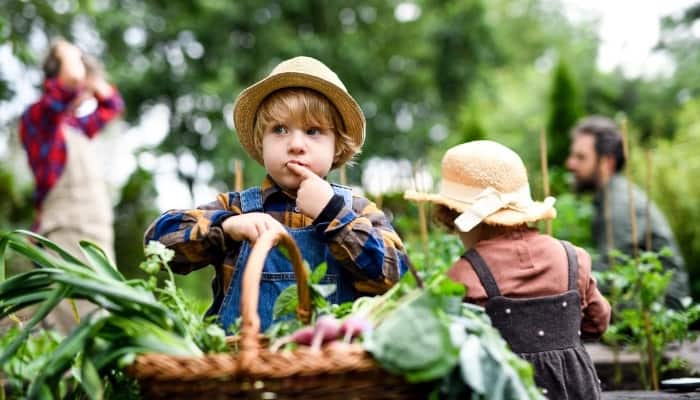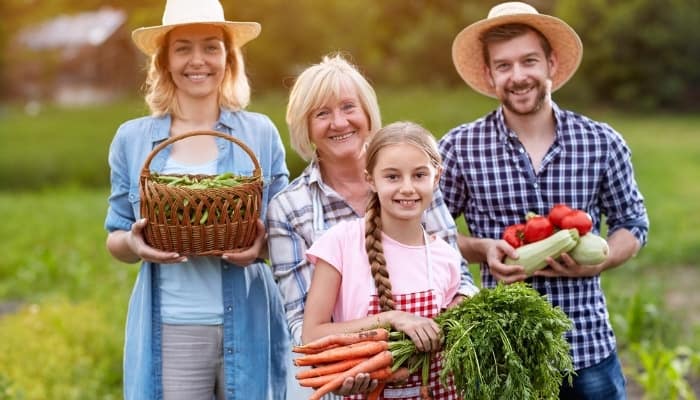Given all the information you have been exposed to about homesteading, it may seem daunting and unattainable. However, this could not be further from reality.
Before we go any further, let’s get one thing out of the way pronto – what does homesteading even mean?
What is homesteading? The term homesteading originally referred to settlers in the 1800s working their land and growing food to sustain the family home. Today, homesteading refers to anyone making sustainable lifestyle choices such as hand-making clothes and raising animals, in order to become more self-sufficient.
Homesteading is a wide spectrum, and there is no strict checklist that needs completing to make someone a true homesteader.
To help you understand what homesteading can involve and how to go about it, here’s your beginner’s guide to the basics – everything from the laws and money-making potential to the recommended skills you’ll need, and more.
Homesteading for Beginners
It’s easy to feel lost with all the homesteading jargon flying around.
So before we move on to the necessary skills and practices, let’s break down what homesteading actually means and address some of the common questions and concerns surrounding it.
What Does Homesteading Mean?
The term homesteading is an extension of the word homestead, which is defined as a house with surrounding land owned by the homeowner that he/she reserves for raising livestock or growing crops.
In centuries past, the word homesteading was defined as “granting a homestead to new settlers on the land,” but it has since taken on the broader definition of individuals or families who strive to live a more self-sufficient life.
What Does Homesteading Involve?
Being a homesteader essentially involves practices that promote a more independent, greener lifestyle, so this typically entails, but is certainly not limited to:
- Growing and preserving your own food
- Raising livestock for eggs, milk, or meat (or all three)
- Handcrafting your own clothing, household/cleaning/beauty products
- Adopting renewable energy options
Why Is It Called Homesteading?
The phrase homesteading came into use when the Homestead Act of 1862 was signed by Abraham Lincoln.
This act essentially granted current and future citizens up to 160 acres of public land, provided they “lived on it, improved it, and paid a small registration fee.”
After that and for much of the late 19th and early 20th century, anyone who settled on Western land or farmed for a certain period of time became known as a homesteader.
Is Homesteading Legal?
Yes, homesteading is entirely legal and is permitted in all US states.
However, each state carries individual conditions and county legislation when it comes to utilities used, zoning restrictions, land activities, etc.
New York, for example, only permits homesteading in specific boroughs.
What Is Modern Homesteading?
Contemporary homesteading is generally defined by those who implement natural, renewable practices into their lives, regardless of the location, size of land, or budget afforded to them.
This could mean repairing items over buying new, preserving food at home, growing herbs and vegetables indoors or on apartment roof gardens (micro-steading), or the small-scale production and selling of handmade clothing/crafts.
What Is the Difference Between Farming and Homesteading?
How Do You Become a Homesteader?
It’s generally recommended that you begin by learning to grow your own fruit, vegetables, or herbs at home to encourage you to rely less on the grocery store.
Those with the backyard space available may also want to start raising a small handful of chicks to practice not only animal care and responsibility but to get involved in the collection and selling of eggs (in addition to possibly breeding chickens).
Becoming a homesteader is really an on-going experience, so it’s important to focus on thing at a time as you steadily become a little more self-sufficient each day.
Are There Homestead Classes?
Absolutely! There are many online courses and workshops designed to give aspiring homesteaders an insight into the relevant techniques needed in addition to advice on making a profitable homestead.
If you’re looking for a more immersive, less technical experience, Wild Abundance based in Asheville, North Carolina runs a number of in-person and online classes here to help beginner homesteaders become better connected with their home garden and nature in general.
In many cases, reading several homesteading books can be almost as valuable as actually taking a class.
How Many Acres Should a Homestead Be?
Many “micro-steading” homesteaders work with as little as a ¼ or ½ acre of land (just large enough to keep a small clutch of chickens and a container garden).
Above this size, there is no set rule for acreage on a homestead, but you will obviously require more space if you plan on raising livestock or growing multiple crops.
How Much Does It Cost To Start a Homestead?
Assuming you are purchasing a home with sufficient land, necessary equipment, and other preparations, the initial startup cost of setting up a homestead can approach $200,000-250,000.
Depending on your scale, you may also spend up to $20,000 per year on animal feed, property tax, healthcare, vehicles, insurance, utilities, etc.
Homesteaders working with less than an acre of land may only face startup costs of around $5,000-10,000.
Bear in mind these are one-time payments, and homesteading should become less expensive each year, particularly if have an income plan in mind.
Can You Make Money Homesteading?
With a lot of effort and time to spare, you can absolutely make money homesteading!
Having multiple streams of income is encouraged if you want to sustain the lifestyle for as long as possible, and it is vital if you want to go fully off-grid.
You can make money in countless ways on your homestead, such as selling:
- Eggs, meat, cheese, or milk
- Livestock
- Fresh fruit
- Baked goods
- Jams & jellies
- Veggies & herbs
- Homemade soap/cleaning products
- Handcrafted clothing & homeware items
When starting out, don’t forget to consider things like how saturated the market is for certain products; how much space you have; whether you have the time and help available to harvest, pick and sell your produce; your climate, etc.
Is It Possible To Be Completely Self-Sufficient?
It is possible to become fully self-sufficient, but even Neanderthals recognized each other’s strengths and worked together to survive.
As it’s not conducive to our nature to be fully isolated from each other, it helps to view self-sufficiency as a mindset and something we should all adopt in varying degrees.

What Is Backyard Homesteading?
Backyard homesteading can be characterized as using the space you have outside your current dwelling (or inside as the case may be with urban apartment gardening) and rediscovering old-fashioned skills and practices, such as keeping chickens, growing food, and learning how to sew, how to reuse, and how to repair items.
Suburban Homesteading
Suburban homesteading is similar to backyard homesteading (on a slightly larger scale) in the sense that you aren’t required to move out and purchase a new property to begin and can start on the land you already have.
Homesteading in a suburban community allows you to share/barter your skills and produce with neighbors, enabling you to live greener by consuming local food.
Homesteading Laws
Homesteading laws vary according to state, but each has the general purpose of allowing property owners to register a section of their land as a “homestead,” making it inaccessible to creditors.
The amount and types of property that can be defined as a homestead will differ across the country – you can find out more here.
What Is Homesteading Exemption?
A Homesteading Exemption is a special provision that reduces property tax on your home, typically by protecting a homestead from creditors in the event of a spouse’s death or bankruptcy.
Conditions vary from state to state with many offering unconditional exemptions while others apply only to the elderly or those with disabilities.
What Are the Best States for Homesteading?
Some states lend themselves better to homesteading due to things like low living costs and property taxes, large farming communities, rebates/incentives for using solar power, high homestead exemptions, and more.
According to World Population Review, the best homesteading states in 2022 are:
- Iowa
- Idaho
- Wyoming
- Arkansas
- Indiana
- Missouri
- North Carolina
- Virginia
- Oregon
- Massachusetts
Homesteading Skills
When it comes to homesteading, the list of handy skills to know is quite long, and generally, the more you know, the better.
Let’s take a look at some of the more important skills to give you an idea of where you’d like to start.
Animal Husbandry & Emergency Care
Whether you plan to raise a small flock of chickens in your backyard homestead or run a multi-acre property with pigs, goats, and sheep, caring for any form of livestock will lead you to develop a wide set of skills and practices – everything from erecting suitable fencing and chicken coops to breeding and correctly (and humanely) butchering.
You’ll also be faced with preparing for livestock health emergencies since veterinarians can’t always be called upon, and you must become familiar with and know how to prevent common livestock illnesses.
Gardening & Food Preservation
Starting your fruit, veggies, and herbs from seed, planting them, and saving the seeds they produce are all vital skills if you want to be more sustainable.
Learning how to properly harvest and preserve your home-grown food is also crucial as it will result in higher quality produce with a longer shelf life.
Become familiar with drying herbs for medicinal/aromatherapy purposes, smoking meat, and canning/pickling foods so you have a well-stocked pantry at all times.
Also learn basic foraging skills and practical methods for things like storing rainwater.
Cooking From Scratch
Making a meal from scratch with fresh ingredients is a skill you can hone now – even in the tiniest city apartment – so don’t wait until you have a homestead to try!
Crafting Your Own Products
Homesteader Missy Rakes from Graceful Little Honey Bee stresses that self-sufficiency is about “having a can-do spirit” and asking yourself “Can I make this at home?”
If you can learn to knit or crochet, you can soon learn to make your own basket or sew your own clothes.
There are hundreds of beginner-friendly tutorials online for these craft skills and others, such as making homemade soap, shampoo, basic herbal medicine, and natural skincare.
Moving Off-Grid
Committing to full or part off-grid living means having less reliance on outsourced supplies and maintenance. It may involve learning about solar energy, windmills, batteries, and more.
For most people, there is a steep learning curve, but the energy independence is absolutely worth it.
Basic First Aid
Things can and will go wrong on a homestead, so you must be prepared to treat any cuts, burns, stings, and other injuries with the help of a substantial first-aid kit as well as having some knowledge of basic first aid such as CPR and other medical emergencies.
Operating Machinery
Mid-sized homesteads commonly use chainsaws to cut down trees and often operate tractors and other farm vehicles.
Repair of these items requires know-how that is best learned before something breaks.
Check your state laws about whether you’ll require a commercial driver’s license (CDL), and we’d strongly recommend taking the Chainsaw Safety (OHSA) Online Course covering everything from the protective gear and mechanics of a chainsaw to proper cutting techniques.
Constructing Farm Buildings
The average homestead will require chicken coops, barns, storage buildings, smokehouses, large-equipment sheds, and more, so a decent understanding of basic carpentry will become invaluable as you build your homestead.
Basic Repairs
A simple skill you can pick up now is how to make basic repairs on everything from worn clothing to machinery and home furniture.
Get accustomed to keeping your house and even your car in good shape by consulting basic DIY and auto-mechanic tutorials to start saving on necessary maintenance costs.
Hunting & Fishing
At first, developing hunting skills can be necessary to protect your livestock from predators, but hunting in the long-term will, of course, provide you with meat, which can be a lifesaver for times when your own provisions are a little low.
Fishing is another immensely helpful homesteading skill – just be sure to research the local laws and licensing aspects of both practices.
Firearms
Knowing how to safely handle and store the guns on your property is absolutely vital not only to prevent harm but to ensure greater accuracy and efficiency when it comes to hunting or defending your property.
Bartering
Being sustainable requires being comfortable with the idea of trading certain goods and services with your neighbors without using money.
When you’re in a maintenance bind, for example, a neighbor’s unmatched carpentry skills could be bartered for any of the following:
- A reciprocal skill of yours
- Cigarettes
- Alcohol
- Medical supplies
- Bullets
- Sugar
- Toilet paper
- Batteries
- Laundry detergent
– you name it!
Budgeting
Learning how to budget effectively is crucial to ensure you don’t spend beyond your means and become overwhelmed by needless debt in your first year as a homesteader.
It will also help you save all you can toward potential emergency purchases.

How To Start Homesteading
- Eliminate any debt – Start saving and making budget-friendly choices in every aspect of your finances. Pay off outstanding loans, mortgages, and credit cards if possible.
- Start simplifying your life – Cut out a few luxuries and unnecessary activities from your life that drain you of time, money, or energy throughout your week.
- Reach out to fellow homesteaders – Start building a support network around you either locally or online. Having experienced mentors and friends is a wonderful thing when you’re new to homesteading and ensures you’re rarely without the resources you need.
- Start gardening! Starting a garden is as easy and inexpensive as placing seeds in soil, watering them, and letting good old sunlight do the rest! (Milk crate gardening is an awesome way to start when you’re low on space).
How To Start a Homestead With No Money
- Take up sewing/knitting (most magazines come with a sample of yarn/thread and free needles/supplies)
- Repurpose the materials you already have – make a trellis with scrap wood, use milk crates for nesting boxes, etc.
- Ask a friend for some seeds
- Barter with a local farmer
- Request a creative kit/course for your birthday/Christmas present, i.e., soap-making kits, jelly & jam-making kits etc.
- Volunteer at a local farm to practice animal care or learn planting/growing skills
- Don’t be afraid to ask for help, and don’t lose hope!
Conclusion
Historically, “homesteading” had a fixed definition relating to settlers receiving government grants, but today, it has become a broad term for anyone who yearns to live a more simplified and self-sufficient lifestyle.
Your desire to start, therefore, shouldn’t be defined by where you live or how much you have in the bank – it’s all about making sustainable lifestyle choices now.
Try one of the above-mentioned skills and see where it may take you!

